NYHETER
Samlade notiser om debatten kring Peak Oil. De flesta länkarna går till
texter på engelska men nu börjar även den svenska debatten ta fart. Har
du läst något intressant som inte finns med här så är du välkommen med
tips.
Energikris.nu erbjuder utbildningar för företag och organisationer som
vill skapa sig en beredskap inför framtidens energisituation.
![]() = svensk text
= svensk text
"Nyheter" behövs inte längre.
När jag startade energikris.nu var det av två skäl.
Det ena var att det inte fanns någon svensk sajt som bevakade oljefrågan.
Svenska nyheter var en sällsynthet, jag satte till och med en svensk flagga
vid de länkar som ledde till något som var skrivet på svenska...
Det andra skälet var att jag ville försöka ta reda på om den ödesmättade
Peak Oil-teorin verkligen kunde vara sann. Vetenskaplig logik sade att den
stämde, men när en enig värld bara skrattade åt den handfull människor som
berättade om en snar produktionsminskning, då ville jag försöka ta reda på
hur det egentligen förhöll sig.
Det visade sig att jag drog igång sajten samtidigt som den globala
oljeproduktionen lade sig på en platå (Maj 2005) varifrån den nu har börjar
falla. Än så länge ganska stillsamt.
Med all sannolikhet befinner vi oss i ett nytt historiskt skede. Vad det
kommer att få för namn är svårt att sia om men kanske blir det Post-Peak
eller något liknande som Bakhtiari skrev här nedan.
Nu är mediabilden en helt annan. Energipriser och matpriser har under en
ganska kort tid dykt upp som de viktigaste framtidsfrågorna.
Oljetillgång tas upp nästan dagligen i media. De som tidigare
framstod som hopplösa pessimister är nu de som blir intervjuade om vad de
tror om framtiden. Jag tappade både ork och intresse ungefär samtidigt som
oljefrågan slog igenom i media. Den intressanta fasen var över och jag hade
fått mina svar.
När jag gick igenom världens oljenyheter på jakt efter något som kunde vara
relevant för energikris.nu så var en del Peak oil-profiler mer välkomna än
andra.
En av de djupast tänkande och mest pålitliga av Peak Oil-profeterna var
Samsam
Bakhtiari. Om han hade rätt så kommer vi inom ett par år att gå över
från det stillsamma T1 (nästan bibehållen oljeproduktion) till T2 då
produktionen kommer att påtagligt minska. Man kan låtsas som ingenting under
T1 men inte under T2. Några år senare är det dags för T3 som innebär mycket
stora inskränkningar i världens energiförsörjning. Bakhtiari lever inte
längre men hans förutsägelser baserades på stor kunskap om oljeproduktion
och generellt har hans förutsägelser tillhört de mest träffsäkra. Så här
skrev han för ungefär två och ett halvt år sedan:
"2006 TO BE FIRST YEAR OF 'TRANSITION ONE'
It is extremely difficult to characterize, delimit and envision the coming 'Transition One' ['T1'] era: we are all about to enter uncharted territory.
In order to try and place into some perspective the gradual switch from 'Peak Oil' to 'T1', allow me to make use of three historical examples:
(1) In the days Prophet Noah was busy building his famous Ark, people used to make fun of him, quipping: "Yesterday a prophet, today a carpenter..."
"Interesting: a ship for the desert..."
They could easily poke fun at him before the 'Peak'; then came the first rain drizzles: Noah's 'T1'! And suddenly things didn't look that funny anymore...
(2) The exquisite Pompeii parallel (with a due reference to Jeremy Leggett's 'Running On Empty' in 'The Guardian' dated November 8): the initial rumblings of the Vesuvius occurred as the volcano reached its 'Peak'; the onset of initial smoke at its top duly opened its 'T1' chapter... (3) Following Andrew Grove (ex-'Intel') and his 'Only the Paranoid Survive' (1996), one can conclude that 'T1' is a "strategical inflection point"
Here, not an industrial one but rather a truly global one: an unprecedented point about "to change all of our fundamentals"
At present, 99.9 per cent of humanity doesn't even suspect the 'T1' phase they are about to enter! A tiny minority has passingly heard of 'Peak Oil', but the large majority will only come to realize that
"a new era is dawning"
when finally ambushed by the looming transition ! Perhaps outrageous fuel bills this coming winter or dramatic gas supply failures might trigger the wake-up call ! Possibly lead to the first outcry !
In any event, the main fact is that people are not prepared at all for this crucial transition, having being lulled into a false sense of security by:
A. The major international oil and gas institutions:
- The 'International Energy Agency' [IEA];
- The US 'Energy Information Agency' [EIA];
- And 'OPEC'.B. The supermajor oil companies of 'ExxonMobil', 'BP' and 'Shell'. C. Most of the major oil consultancies --- with top of the list and most sanguine: the 'Cambridge Energy Research Associates' [CERA]. D. A number of so-called 'economic oil specialists' the like of Prof. Adelman (MIT) and Prof. Odell (ex-Erasmus University). E. The silence of the large majority of politicians both in the West and the East (as any political figure would rather die than be the harbinger of bad news --- even if that could prove to be a beneficial clarion call for his fellow citizens). F. The marked lack of interest of global media and even local radio and TV channels (mainly due to the inescapable fact that with 'Peak Oil' and 'Transition One' there is little money to be made: no advertising, no sponsors).
Incidentally, seems 'Hollywood' was once again first out of the starting gate with its 2005 film 'Syriana' !So, in 2006: "expect the unexpected" as the 'T1' train begins to gather steam... "
"From “Peak Oil and Bakhtiari's 4 Phases of Transition,” Whiskey and Gunpowder (8/25/06), by Byron King, quoting Bakhtiari directly from an email:
"The four Transition periods (T1, T2, T3, and T4) will roughly span the 2006-2020 era. Each Transition [will] cover, on average, three to four years. The major palpable difference between the four Ts is their respective gradient of oil output decline -- very small for T1, perceptible for T2, remarkable in T3, and rather steep for T4. In fact, this gradation in decline is a genuine blessing for those having to cope and adapt.
"It should be borne in mind that these four Ts are only an overall theoretical structure for future global oil output. The structure is thus so orderly because [it is] predicted with 'Pre-Peak' methods, 'Pre-Peak' assumptions, and [a] 'Pre-Peak' set of rules.
"The problem is that we now are in 'Post-Peak' mode, and that none of [the] above applies anymore.
"The fact of being in 'Post-Peak' will bring about explosive disruptions we know little about, and which are extremely difficult to foresee. And the shock waves from these explosions rippling throughout the financial and industrial infrastructure could have myriad unintended consequences for which we have no precedent and little experience.
"So the only Transition we can see rather clearly (or rather, we hope to be able to comprehend) is T1. It is clear that T1 will witness the tilting of the 'Oil Demand' and 'Oil Supply' scales -- with the former dominant at the onset and the latter commanding toward the close (say, by 2009 or 2010)"
Med de här citaten ber jag att få tacka för mig. I alla falla för en
tid. Kanske gör jag om sajten om den kan fylla något syfte i vår nya
Post-Peakvärld, eller så tar någon annan över efter mig.
Alingsås 18/6 2008 Jonas Dahl
------------------------------------------------------------------------------------------------------------------------------------------------
De gamla nyheterna här nedanför kan studeras för att se hur diskussionen löd innan man visste riktigt säkert. Lycka till!
Kort överblick över prognoser om oljepris
Goldman-Sachs förutspådde nuvarande prisläge redan 2005 och menar nu att nästa "superspike", om den kommer, ger oljepris upp till 200 dollar per fat. Andra pekar på effekten om en sjunkande världskonjunktur minskar oljeförbrukningen så att ett överskott skapas. Priset kan då rasa kraftigt.
"And while BP says that the world still has enough proven oil reserves to provide 40 years of consumption at current rates, it is no longer a secret that for every nine barrels of oil consumed we are only discovering one."
""We are in an era of higher oil prices, and so if we look at $100/bbl oil we have to do so with an understanding that prices are unlikely to return to levels seen in the early part of this decade," the IEA said in its monthly report."
Läs mer i iAfrica.
Venezuela producerar mer
Petroleos de Venezuela , det statliga oljebolaget som hanterar Orinocos sega svårbehandlade olja, meddelar att man producerar mer än förväntat. Nästan 600 000 fat per dag.
Läs mer hos Rigzone.
Dyraste oljan någonsin
Den fallande dollarn ligger bakom mycket av det stigande oljepriset men nu har vi förmodligen ett inflationsjusterat pris som är det högsta någonsin. Man kunde förvänta sig att det skulle hamna på löpsedlarna men så är det inte. Många skriver om det hela och här kommer ett exempel.
Jeff Sanford på Canadian Business är förvånad över att priset bara håller sig kring 109 dollar och inte högre.
"No wonder the price of oil is at $109. You’d almost think it should be higher. So, is there any hope for that a new flood of oil from other sources that would complete the cycle and lead to another generation of low prices? This is the key question in oil markets today — and it’s one that takes us to the heart of the debate between the “cornucopians” (those who suggest there’s lots left to find) and the depletionists, the peak oil types who say that we’ve found all there is."
Läs mer i What`s up with oil?
Vem vill ta över?
Efter drygt två och ett halvt år med Energikris.nu är det dags för mig att dra mig tillbaka.
Ett brev från Anders L. (stort tack!) väckte mig.
Jag inser att jag inte längre har tid och möjlighet att lägga sena kvällstimmar som jag tidigare gjort. Uppdateringarna har därför glesnat och jag inser att sidan förlorar sin relevans om det fortsätter på samma sätt. Jag anser fortfarande att problematiken kring Peak Oil är intressant, viktig och dramatisk, men eftersom jag inte kan vara så aktiv som jag skulle önska är det bättre att sluta.
Som jag ser det så finns det två alternativ. Det ena är att någon annan tar över och driver sajten vidare. Idag är Peak Oil ingen udda företeelse så det finns säkert flera tänkbara efterträdare.
Det andra alternativet är att ingen efterträdare dyker upp. Då kanske jag har kvar sajten, men slutar att uppdatera nyheterna.
Är du intresserad av att ta över så skriv till info(snabela)energikris.nu
Peak Oil finns inte
Aramcos VD Abdallah Jumah menar att det relativt höga oljepriset beror på spekulation och inte på att den globala oljeförsörjningen är hotad.
"Teorin, som spår att världens oljeproduktion nu är nära toppen och snart kommer att börja sjunka, är helt felaktig enligt saudiern."
Läs mer hos Dagens Industri.
Läs även några av de (just nu) 133 kommentarer som artikeln har givit upphov till. Här kommer ett välfunnet citat från signaturen "pe ess" i kommentar nr 21:
"Att Saudi överhuvudtaget uttalar sig om peak oil påminner mig om min kusin som vid späd ålder plötsligt utbrast: "Jag har inte pruttat".
Trovärdigheten i kungadömet har defnintivt peakat för längesedan. Det finns stor risk att de har misshushållat med sina oljereserver genom att pumpa upp för mycket olja för snabbt och därigenom skadat de oljeförande geologiska sturkturerna. Och insynen är som någon påpekade lika med noll."
Justerad tidsram
Energianalytikern Charles Maxwell skriver att hans tidschema för de olika delarna av Peak Oil (OPEC, icke-OPEC osv. har fugerat ganska bra under en sexårsperiod, men nu när några milstolpar närmar sig (t.ex. icke-OPECs produktionstopp) så är det dags att justera tidsplanen en smula. När det gäller oljeproduktionen utanför OPEC bör toppen hamna på 2008 snarare än 2010 vilket var det tidigare antagandet.
"So, the particular time frames set out above carry us to a series of oil production peaks: 2008 for the non-OPEC group of countries, 2011 for the crude oil volumes of major oil companies, 2013 for global flowing oil, and 2015 for all liquids (both conventional and not)."
"I obviously had misplaced hopes in those days that such preparations might allow us to delay the oncoming Peak by an all-out effort to lower world demand for oil. However, I’m now convinced that governments, the public, oil companies, and industry in general are not going to react sufficiently to signals about future problems in energy availability and use. So, it seems likely that we will march right into the next energy crisis with bands playing and flags flying before the final curtain comes down."
Läs mer hos ASPO-USA: The Oil Price Rise--Timing Benchmarks Delineate Our Likely Advance to the Oil Peak
Räcker megaprojekten?
Han är redaktör för Petroleum Review och länge kämpade han mot "stollarna" inom Peak Oil-rörelsen. Han böjde sig så småningom för siffror som visade att peak Oil var en trovärdig teori och idag är han en av de mest välkända Peak Oil-förespråkarna. Han heter Chris Skrebowski och han har tagit på sig uppgiften att sammanställa alla kommande större oljeprojekt, s.k. megaprojects. Så länge de tillkommande projekten kan leverera lika mycket olja eller mer än de källor som sinar tappar i produktion, så länge är inte Peak Oil här. När det inte längre går har vi passerat toppen.
Skrebowskis föreläsningsunderlag från hans ASPO-föredragning i höstas består av 42 bilder. Några är redan inaktuella pga. att oljan har varit dyrare än väntat under vintern. Klicka för större bilder.
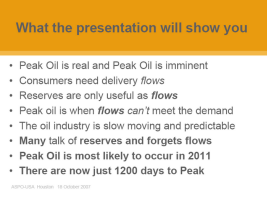
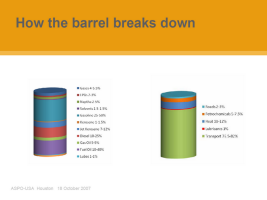
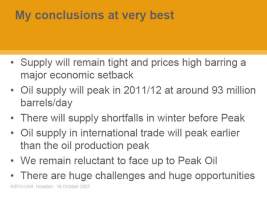
Här kan du se hela bildserien.
Är biobränslen det stora hotet?
Stuart Staniford på The OilDrum, känd för sina noggranna analyser av data, har tagit sig an det som av många ses som oljans självklara ersättare: biobränslen. Raps, vete, majs och skog förvandlas till etanol, RME etc. så att våra asfaltbaserade infrastruktur inte behöver förändras.
Stuart är noggrann som vanligt. Ett trettiotal grafer och en hel del ord. Vad händer om västvärlden på allvar kör in på etanolspåret? Hur mycket jordbruksmark tas bort från matproduktion?
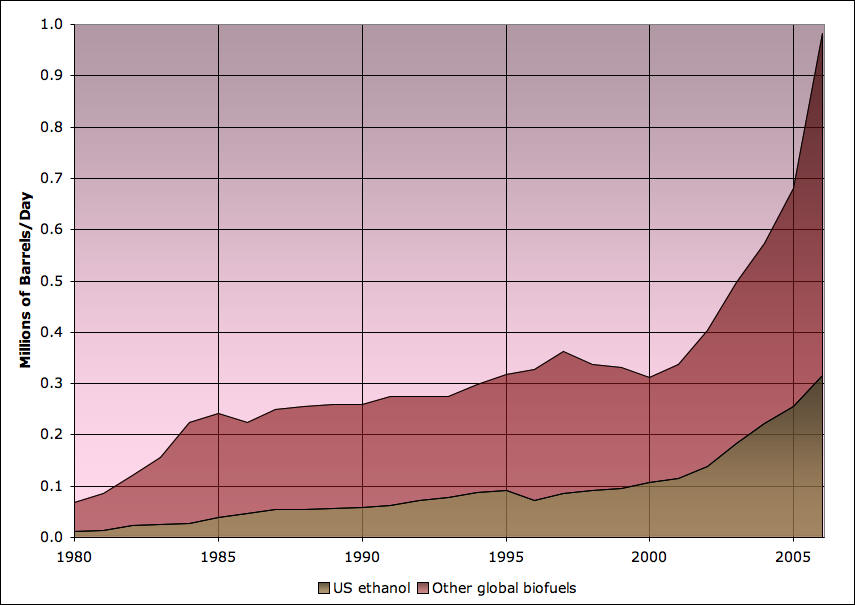
Mycket läsvärt, men för dig med ont om tid kommer ett citat med sammanfattningen här.
"The Renewable Fuels Association reported recently that 3/4 of Americans believe we should increase our reliance on ethanol. This kind of thinking has led to subsidies and mandates for biofuel production in the US, in Europe, and even in a number of developing countries.
My conclusion in this analysis is that this broad agreement is in fact mistaken. It is based on a failure to appreciate the speed with which high oil prices and profitable biofuel operations can fuel a very rapid growth of the industry up to the point that it consumes a sizeable fraction of global food production. This will have only modest benefits for global fuel supply, but will cause massive abrupt global hardship in poor countries. Many unforseeable consequences may follow from that.
I suggest we reconsider our policy."
Läs gärna hela Fermenting the Food Supply.
Saxo spår dystert 2008
Danska Saxobank har inlett 2008 med att ta i lite extra i sin prognos för året. Man söker förmodligen uppmärksamhet och debatt, vilket man nog kan få.
"Saxo Bank håller inte igen när det gäller negativa profetior. Under 2008 tror de att oljepriset stiger till 175 dollar per fat samtidigt som livsmedelspriserna fördubblas från dagens redan höga nivå.
"Vi tror att oljeproduktionen nått toppen och att utbudet av olja i världen nu kommer att sjunka. Detta samtidigt som stark efterfrågan i Asien kommer att driva upp priserna ytterligare."
Inte nog med att livsmedels- och oljepriserna ska stiga kraftigt dessutom befarar Saxo att de kinesiska och amerikanska börserna båda kommer att falla kraftigt med 40 respektive 20 procent."
Läs mer i Dagens Industri
Simmons: Tillväxten stoppas om efterfrågan ökar 2%
"Simmons told EnergyTechStocks.com that if demand rises 1.5% to 2%, unless crude production quickly rebounds to its peak set in May 2005 and then keeps growing in step with demand, the world will draw down stocks to the point “where shortages stop further growth.”
"as EIA predicts, the average price of a gallon of regular tops $3.40 next spring. With a $3.40 or higher national average, several big population states like New York and California likely will top $4 a gallon. The question will be whether 2008’s record high gas prices finally cause Americans to drive less, which several experts don’t expect will happen because of Americans’ auto dependency."
Läs mer hos EnergyStocks.com
TV-intervju med Vijay Vaitheeswaran och Robert L. Hirsch
De har olika syn på vad Peak Oil kan föra med sig. Se den 6 minuter långa filmen från Foreign Policy.
Om inte den inbäddade filmen fungerar kan du klicka här.
ASPO Nyhetsbrev No. 85 Januari
Innehåll:
897. In Memory of Ali Samsam Bakhtiari
898. ASPO AUSTRIA
899. Major Oil Companies pass peak
990. Living through the Energy Crisis
991. Marketing Peak Denial
992. Comments on an article in the Sunday Times of December 16th 2007
993. Reporting More
994. Brasil Analysis Updated
995. Zero-Sum Future
996. New US policy to cut oil consumption
997. Financial Times comments on the US Situation
998. The Pope addresses the Energy Issue
999. Data for 2007
Hämta som pdf (0,3MB) hos ASPO Irland.
100 dollar är billigt - eller dyrt
100 dollar är visserligen rekordpris, men är det dyrt? Allt beror på hur man ser på det hela. Man se det som Matt Simmons: Olja är så användbart att nuvarande pris är är alldeles för billigt för dess värde. Eller så kan man se det som oljeanalytikern Jan Stewart.
Båda kan ses i ett 10 minuterYouTube-klipp från ett inslag från Bloomberg-TV.
100 dollar
Oljepriset har legat mellan 90 och 100 dollar under en längre tid och igår skedde det som många väntat eller befarat. Olja såldes för 100 dollar innan priset sjönk något. Orsakerna anges vara oroligheter i Nigeria, men framför allt att den globala oljeförsörjningen är så ansträngd att minsta störning höjer priset.
"This is an important psychological number,'' said Rick Mueller, an analyst with Energy Security Analysis Inc. in Wakefield, Massachusetts. ``Everyone has been expecting this since early December.''
Prices on Oct. 15 passed the previous all-time inflation- adjusted record. Measured in today's dollars, oil in 1981 rose as high as $84.73 after a decade of Middle East instability including the Arab-Israeli war in 1973, the Iranian revolution in 1979 and the Iran-Iraq war that began in 1980."
"These prices are here to stay,'' said Emil Pena, member of the advisory board at Calgary-based Genoil Inc. and the executive director of the Energy and Environmental Systems Institute at Rice University in Houston. ``We have to come to grips with these high prices. I hope this will lead to us becoming more efficient and increase our energy education.''
Läs mer hos Bloomberg, Oil Touches $100 a Barrel on Supply Concern, Increased Demand.
Nederländska grafer
Ny utgåva av Oilwatch Monthly, decembernumret.
Två lånade bilder, index och en graf över världens oljeproduktion
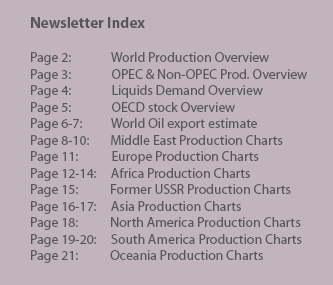
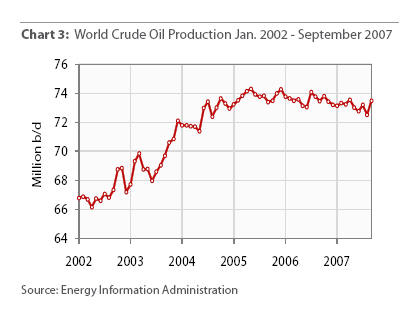
Mycket av innehållet är en diskussion kring den ökning som kan ses för september. Är det en tillfällig knyck, eller är det ett trendbrott framkallat av de stigande oljepriserna?
Här kan du hämta hem nyhetsbrevet (PDF 1,6MB).
Mer olja på gång
Michael C. Lynch har gjort sig känd som oljeoptimist. Han skriver i "Energytribune" om varför han tror att oljepriset kommer att sjunka redan nästa år och om varför oljepriset har varit som det har den senaste tiden.
"Much of the current market wisdom reflects recent developments – and clichés, such as “the easy oil is gone” and “demand is soaring” – not unlike the projections of many superficial analysts that the latest trend will last forever. Present demand growth is one-half to two-thirds the long-term trend, and while Chinese oil demand is growing rapidly this year, it is much slower than in the past – about 6 percent now, versus 8 to 10 percent previously. The easy oil didn’t suddenly disappear five years ago, and OPEC surplus capacity has been low for most of the last 15 years, without prices soaring."
Läs mer i A Hard Rain is Gonna Fall on Oil Prices (Probably)
Långfilm om Peak Oil
A Crude Awakening - The Oil Crash, en film om vårt beroende av oljan och om hur framtiden kan komma att se ut. Filmen är 1 timma och 23 minuter lång och innehåller intervuer med Campbell, Simmons, Hubbert själv m. fl.
Filmen ligger hos Google Video och är kraftigt krympt. Ljudet är ganska ok, men bilden är emellanåt så grov att man ibland inte kan läsa de engelska texterna som dyker upp när andra språk talas.
Filmen är mycket sevärd. Den finns strömmande och är helt gratis hos Google.
Tack Sverker, för tipset.
Heinberg om olja, klimat och mat
Richard Heinberg har skrivit ett längre epos, egentligen ett tal han höll i England, om vad framtiden kan föra med sig när fyra stora skeenden påverkar oss.
De fyra är
Fördyringar inom jordbruket
Ökad efterfrågan på bioenergi
Klimatförändringar och extremt väder
Krympande naturresurser, främst matjord och färskvatten
Om man därtill lägger Peak Oil så har man en intressant framtidsdiskussion. Artikeln är ganska lång så jag lägger ut flera citat än vanligt.
"Many put their hopes in coal and other low-grade fossil fuels to substitute for depleting oil. However, global coal production will hit its own peak perhaps as soon as 2025 according to the most recent studies, while so-called "clean coal" technologies are three decades away from widespread commercial application.8 Thus to avert a climate catastrophe from coal-based carbon emissions, our best hope is simply to keep most of the remaining coal in the ground."
"To be sure, higher food prices are good for farmers - assuming that at least some of the increase in price actually translates to higher income for growers. This is indeed the case for the poorest farmers, who have never adopted industrial methods. But for many others, the higher prices paid for food simply reflect higher production costs. Meanwhile, it is the urban poor who are impacted the worst."
"The US is responsible for 70 percent of world maize exports, and countries such as Mexico, Japan, and Egypt that depend on American corn farmers use maize both as food for people and feed for animals. The ballooning of the US ethanol industry is therefore impacting food availability in other nations both directly and indirectly, raising the price for tortillas in Mexico and disrupting the livestock and poultry industries in Europe and Africa."
Lester Brown, founder of the Washington-based Earth Policy Institute, has said: "The competition for grain between the world's 800 million motorists, who want to maintain their mobility, and its two billion poorest people, who are simply trying to survive, is emerging as an epic issue."
"The history of US oil production also helps us evaluate the prospects for delaying the global peak. After 1970, exploration efforts succeeded in identifying two enormous new American oil provinces - the North Slope of Alaska and the Gulf of Mexico. During this period, other kinds of liquid fuels (such as ethanol and gas condensates) began to supplement crude. Also, improvements in oil recovery technology helped to increase the proportion of the oil in existing fields able to be extracted. These are precisely the strategies (exploration, substitution, and technological improvements) that the oil producers are relying on to delay the global production peak. In the US, each of these strategies made a difference - but not enough to reverse, for more than a year or two at a time, the overall 37-year trend of declining production. To assume that the results for the world as a whole will be much different is probably unwise.
The recent peak and decline in production of oil from the North Sea is of perhaps of more direct relevance to this audience. In just seven years, production from the British-controlled region has declined by almost half."
Läs gärna hela What Will We Eat as the Oil Runs Out?
Mer om Bakhtiari
ASPO-USA:s Steve Andrews har skrivit en artikel om Samsam Bakhtiari som är väl värd att läsa. Bakhtiari dog av en oväntad hjärtattack den 30 oktober.
"Anyone who ever heard him speak or who read his many articles (some 70 printed in journals; visit his website at http://www.sfu.ca/~asamsamb/sb.htm) suspected this truism as well: that Ali was a Renaissance man. He spoke and read at least six languages fluently enough to be able to quote some notable philosophers and authors in their native tongues"
"The four Transition periods (T1, T2, T3, and T4) will roughly span the 2006-2020 era. Each Transition [will] cover, on average, three to four years. The major palpable difference between the four Ts is their respective gradient of oil output decline -- very small for T1, perceptible for T2, remarkable in T3, and rather steep for T4. In fact, this gradation in decline is a genuine blessing for those having to cope and adapt.
"It should be borne in mind that these four Ts are only an overall theoretical structure for future global oil output. The structure is thus so orderly because [it is] predicted with 'Pre-Peak' methods, 'Pre-Peak' assumptions, and [a] 'Pre-Peak' set of rules."
"The problem is that we now are in 'Post-Peak' mode, and that none of [the] above applies anymore."
Hela artikeln finns hos ASPO-USA och heter Remembering and Learning from a Legend .
Olje-VD med en annan syn
Jim Mulva sitter vid rodret för Conoco-Phillips som är ett av de ganska få företag som investerar efter tron att oljepriset skall förbli relativt högt. De flesta bolagen gör bara investeringar som lönar sig med ett oljepris runt 40 dollar, men Mulva tror inte att oljan blir billig igen.
"Talking a little bit about the supply challenge. This is a slide that's been prepared by International Energy Agency and it just shows if you take all of the oil production around the world today, say, 86 million barrels a day, the natural decline on average is about 8% a year.
So, if we're going to stay with 86 million barrels a day, we've got to be out there adding 6 or 7 million just to stay flat. So the question is, where is that all going to come from when you see Saudi, Arabia saying they're going to go to 12 million to 12.5 million and maybe up to 15 million barrels a day? How is this going to happen? It's not so important just what I think or say, but I know we've been saying for the better part of nearly 12 months. Personally, I don't think we're going to see --- for three reasons, I don't think we're going to see the supply go over 100 million barrels a day. The reason for that is, where is it all going to come from?
"Second, it's going to be from a climate change greenhouse gas emission? I'm not so sure that the world, even if you could get up to those levels, would allow us it be done. So we have -- Demand maybe going up, but it's going to be constrained by supply."
Allt enligt Foreign Policy.
Bakhtiari är död
Ali Morteza Samsam Bakhtiari avled i Teheran under oktober. Han var en av de få inom ASPO som kom från ett OPEC-land och han avvek från Peak Oil-debattens mångordiga och ibland högröstade meningsutbyte. Han var förmodligen en gammaldags aristokrat och jag uppskattade hans texter och jag har ofta letat efter mer material av honom, men han kanske bara skrev om Peak Oil när han visste att han hade något viktigt att säga.
Han blev även känd för att ha gjort den hittills bästa förutsägelsen av när Peak Oil skulle inträffa.
Här är några länkar från ODACs notis om Bakhtiaris död.
Peak Oil and Bakhtiari's 4 Phases of Transition
Nothing Like Business as Usual
Bakhtiari On Middle East Oil Reserves Ali Morteza Samsam Bakhtiari, EV World, 20 February 2006
The man who foresaw skyrocketing oil prices Adam Porter, Aljazeera, 1 October 2004
Besök gärna hans egen sida där fler texter finns att läsa. Bakhtiari fick bara uppleva den första av sina fyra tänkta övergångsfaser. Han kallade den för T1 som sedan skall följas av T2 osv. Här följer ett citat av Byron King där han försöker beskriva de fyra övergångsfaserna.
Dr. Bakhtiari's 4 Phases of Transition
"The four Transition periods (T1, T2, T3, and T4) will roughly span the 2006-2020 era. Each Transition [will] cover, on average, three to four years.
"The major palpable difference between the four Ts is their respective gradient of oil output decline -- very small for T1, perceptible for T2, remarkable in T3, and rather steep for T4. In fact, this gradation in decline is a genuine blessing for those having to cope and adapt.
"It should be borne in mind that these four Ts are only an overall theoretical structure for future global oil output. The structure is thus so orderly because [it is] predicted with 'Pre-Peak' methods, 'Pre-Peak' assumptions, and [a] 'Pre-Peak' set of rules.
"The problem is that we now are in 'Post-Peak' mode, and that none of [the] above applies anymore.
"The fact of being in 'Post-Peak' will bring about explosive disruptions we know little about, and which are extremely difficult to foresee. And the shock waves from these explosions rippling throughout the financial and industrial infrastructure could have myriad unintended consequences for which we have no precedent and little experience.
"So the only Transition we can see rather clearly (or rather, we hope to be able to comprehend) is T1. It is clear that T1 will witness the tilting of the 'Oil Demand' and 'Oil Supply' scales -- with the former dominant at the onset and the latter commanding toward the close (say, by 2009 or 2010).
"But even during that rather benign T1, the unexpected might become the rule and the orderly 'Pre-Peak' rapidly give way to some chaotic 'Post-Peak.'
"In any instance, the overall structure of the 'Four Transitions' is a general guideline for the next 14 years or so -- as far as global oil output is concerned. In practice, reality might prove to be worse than these theoretical Transitions; but certainly not better."
75-85 dollar per fat är lagom
Thomas Petrie, vice ordförande hos Merrill Lynch & Co, menar att oljepriset inte kan hålla sig på 90-dollarsnivån så länge till.
"Once we moved from $70 to $90, at the upper end of that range, we're getting into a zone where demand destruction is happening," Petrie said. "We'll probably be able to measure it in the next six to nine months. I think the Saudis are worried about that, which they should be. They learned a very painful lesson in the early '80s about 'overstaying the party' on demand destruction."
Läs mer hos Denver Post
Vietnam slopar bränslesubventioner
Många av världens länder subventionerar köp av energi för att på så sätt stimulera landets ekonomi. För många länder börjar subventionerna bli en tung börda, men man kan i vissa fall riskera protester och politisk instabilitet om subventioerna tas bort. Vietnam har beslutat att subventionerna skall bort nästa år.
"Vietnam has annually compensated some 10 trillion Vietnamese dong (625 million U.S. dollars) for prices oil and petroleum products in recent years, the paper quoted Vietnamese Prime Minister Nguyen Tan Dung as saying at a local finance meeting on Wednesday.
Stopping the compensation will help save state money to deal with more urgent issues, he said."
Läs mer i Vietnam to stop subsidizing oil price in 2008Dags att se över ekonomin?
Dave Cohen har skrivit om varför världsekonmin inte går i baklås trots att oljepriset håller sig på relativt höga nivåer under många månader. Han hävdar att många Peak Oil-predikanter inte har bearbetat de ekonomiska aspekterna tillräckligt. Man antar att Peak Oil innebär ekonomisk kollaps utan att se på problemet i detalj. Artikeln är någorlunda omfattande och avslutas med orden:
"Many of those concerned about peak oil take their economic assumptions—naively, peak followed by collapse—as axiomatic. So-called "doomers" assume the worst, but they have not done all of their homework. Peak oil theorists or commentators often ignore the economic literature that discusses the complex relationship between GDP growth and the oil markets. They do so at their peril. By default, the oil supply and price is seen as the single overwhelming determinant of economic performance. This simple model is belied by the demand-driven price shock of the 2003-2007 period. Many economists have also been taken by surprise, and they are scrambling around to come up with explanations.
It is time for many of those studying peak oil to develop well thought-out scenarios that include models of future economic activity based on their oil supply projections instead of running around telling everybody the sky is falling. The good news is that there may be time to develop such scenarios and implement solutions, like a robust national railroad system, that make sense. Time will tell."Läs gärna hela Questioning Peak Oil Economic Assumptions
Produktionen sjunker sakta - Vad händer sedan?
Stuart Staniford på The OilDrum har varit frånvarande ett bra tag så han har hunnit tänka och räkna riktigt noga.
Hans nya artikel försöker utröna hur mycket av de någorlunda stadiga 83-85 miljonerna fat olja per dag som produceras som kommer från nytillskott. M.a.o. hur mycket faller de befintliga oljekällorna egentligen i produktion. Det är av flera skäl ganska komplicerat, men han lotsar läsaren genom en beviskedja som utmynnar i att han själv nog blev mer pessimistisk än han var tidigare. Han tycker sig ha funnit en accellererad produktionsnedgång som kommer att bli svår att ersätta.
"Given that it's presently mysterious why the base production decline is worsening, it's hard to say for sure whether we should yield to the temptation to extrapolate that straight line further into the future. Obviously, continued degradation in that quantity would be negative for the world economy, since at some point there just wouldn't be enough new projects to keep up with it.
To explore the space of possibilities, this final graph presents four
scenarios for total liquids production through the end of 2009."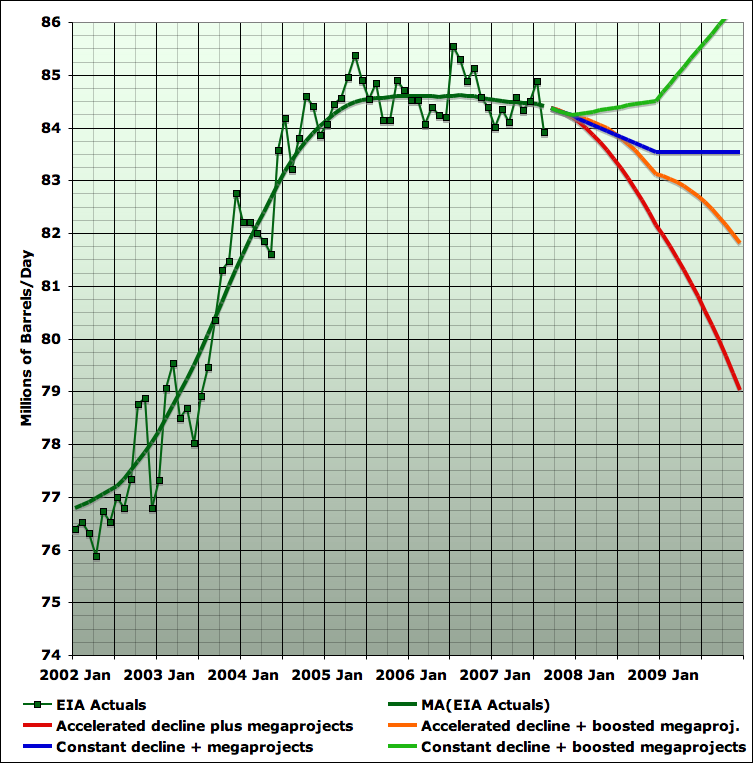
Läs gärna hela Is the Decline of Base Production Accelerating?
99-dollars-olja
Efter en ny rekordnotering för WTI-olja, 99,29 dollar per fat, sjönk priset tillbaka något under onsdagen. Dagens Industri har en artikel om ämnet.
"Jag trodde att vi skulle se uppgångar eftersom att det här inte var någon prissänkande rapport. Det här indikerar ibland att marknaden är utmattad och att rallyt är över. Den enda prissänkande siffran var ökningen på 1 miljon fat i Cushing", säger Kyle Copper, analyschef på IAF Advisors till Bloomberg News.
"Jag hoppas vi kan nå över 100 dollar så att vi kan avsluta den här fixeringen. Jag tror fortfarande att efterfrågan kommer att falla, även om det kommer ta en viss tid", säger Chip Hodge på MFC Global Investments till Bloomberg News."
Läs mer i Oljepriset backade
Energy Angst
Llewellyn King skriver om att atmosfären har förändrats i världens oljehjärta Houston. Varningar om att oljesystemet inte kommer att klara av framtida påfrestningar kommar från allt fler håll.
"But in 37 years of writing about energy, in boom and bust, I have never found the kind of fatalism that now grips the oil patch."
"If you think the negatives are coming only from oil patch radicals, try Rex Tillerson, chairman of ExxonMobil. He told the World Energy Conference in Rome that if the world oil-dominating, state-owned oil companies are not freed from political control, and allowed to bring in western technology and capital, then a crisis is inevitable.
There is evidence that the oil majors themselves are hurting. When oil passed $60 a barrel, their profits shot up. But they are not up commensurately with oil at $90 a barrel. The big guys are getting squeezed."
Läs mer i Energy Angst: Long-Term Oil Gloom Spreads In Houston
Simmons på video
Simmons blir intervjuad och lägger fram sina åsikter om att oljan är för billig (15 cent/kopp), att reservkapaciteten har försvunnit och att oljeindustrin har för gammal utrustning och personal. Mm.
Se den själv hos YouTube.
OPEC-mötet
Oljepriset ligger fortfarande mellan 90-100 dollar per fat och OPEC-mötet i Riyadh har haft stora förväntningar på sig. Skule man öppna kranarna för att sänka priset, eller skulle man låtsas som ingenting? Kan OPEC fortfarande öka sin produktion tillräckligt för att sänka priset? Många uttalanden från OPEC-höjdare var motsägelsefulla och lyckades inte lugna energimarknaden. Här kommer några citat från Yahoo News:
"OPEC's president said Thursday that "potentially dangerous" high crude prices were beyond the cartel's control as leading members defied pressure to raise their output to help ease the burden of near 100-dollar oil.
"OPEC is doing all it can for prices to be suitable" for consumers and producers, Hamli said. "But it is clear that factors are beyond OPEC's control."
"Why should we increase production?" said Algerian Energy Minister Chakib Khelil, who claimed a production hike would have no influence on prices.
"The sort of escalation in prices we have seen in the last four months is unprecedented and we certainly can't relate that directly to issues of market supply or demand," he said.
"It's being driven by speculation and geopolitical factors.
"OPEC's biggest and most influential member Saudi Arabia earlier this week described fears of supply shortages as "groundless" and OPEC secretary-general Abdallah al-Badri on Wednesday voiced his opposition to an increase in output."
Läs gärna mer i OPEC says unable to calm runaway oil prices
Stort fynd i Brasilien
Brasilien meddelade för några dagar sedan att man funnit stora mängder lätt olja utanför den brasilianska kusten. De korta nyhetsmeddelandena berättar om extremt stora oljefynd och känns som om de saknar en hälsosam kritik. Är det för bra för att vara helt sant? Det har hunnit samas en hel del kommentarer hos dagens industri. Läs dem gärna.
Det här skulle kunna få Brasilien att gå från att vara en mellanproducent till att bli en av världens största oljeproducenter", sa president Lula da Silvas stabschef Dilma Rousseff under en presskonferens.
"Vi kan nå samma nivåer som Saudiarabien och Venezuela", fortsatte hon vidare. "
Läs mer hos DI.
071115
Earth
Policy Institute: Is world oil produktion peaking?
"Among the countries where
production may be peaking are Saudi Arabia,
Mexico, and China. The big question is Saudi Arabia. Saudi officials
claim they can produce far more oil, but the giant Ghawar oil field—the
world’s largest by far and the one that has supplied half of Saudi oil
output for decades—is 56 years old and in its declining years. Saudi
oil production data for the first eight months of 2007 show output of
8.62 mb/d, a drop of 6 percent from the 9.15 mb/d of 2006. If Saudi
Arabia cannot restore growth in its oil production, then peak oil is on
our doorstep."
Läs mer här.
071114![]()
Morgan
Stanley: Sälj!
Dagens Dagens Industri har en artikel om en pessimistisk bank.
"Investmentbanken
Morgan Stanley uppmanar sina kunder att sälja aktier och invänta en
recession. Det skriver banken i sin senaste strategirapport.
"Vi är mycket tveksamma till den fortsatta ekonomiska utvecklingen på
grund av den allt djupare finansiella krisen och centralbankernas
motvillighet att sänka räntorna med tanke på inflationshotet", skriver
banken i sin senaste strategirapport.
Morgan Stanley tror det blir alltmer sannolikt att den amerikanska
bolånekrisen kommer att leda till en lågkonjunktur i USA. Denna kommer
sedan i första hand att spridas till Europa och därefter till resten av
världen inte minst med tanke på den svaga dollarn och det rekordhöga
oljepriset."
Läs mer hos DI.
071110![]()
Rekorddyr
olja - än sen!
Tidskriften Fokus har en artikel med svenska bensinbolagsmänniskor och
Marian Radetzki. Det handlar om bensinpris, svag dollar och varför det
blir rubriker men inga hål i plånboken och argumenterar för att
nuvarande oljepris, knappt 100 dollar fatet, inte påverkar Sverige
nämnbart.
"Marian
Radetzki säger att han inte riktigt kan förklara varför priset har
rusat så som det har gjort. Enbart sedan i september har den så kallade
WTI-oljan stigit med 30 procent och när en av landets ledande experter
säger att han känner sig rådvill, och att han gärna erkänner det,
undrar man vad det egentligen är som händer."
Läs mer hos
Fokus.
071110
Framtidsscenario
Paul Chefurka har funderat kring hur energi- och populationskurvorna
kan tänkas se ut fram till år 2050. Han kallar sig för en "doomer" och
ser inte särskilt optimistiskt på framtiden. Han visar med långa
resonemang och flera grafer ganska tydligt hur framtiden kanske kommer
att te sig.
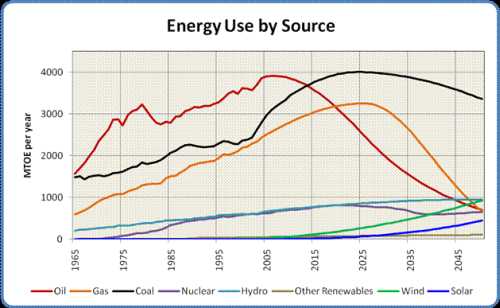
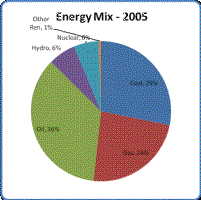
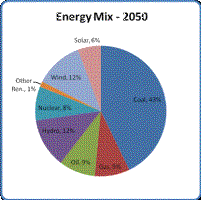
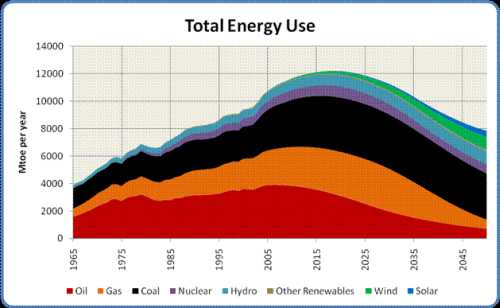
Läs gärna mer hos The
Oildrum Canada
071110
"Peak Oil is now"
Rapporten från EWG, Energy Watch Group, slog ner märkbart i Peak
Oil-debatten under mitten av oktober, men vi har missat att länka till
dem här. Så här kommer de:
Sammanställningen är på 14 sidor, har snygga grafer och är tydlig i
sitt budskap.
"“Peak oil is
now”.
For quite some time, a hot debate is going on regarding peak oil.
Institutions close to the energy industry, like CERA, are engaging in a
campaign trying to “debunk” the “peak oil theory”. This paper is one of
many by authors inside and outside ASPO (the Organisation for the Study
of Peak Oil) showing that peak oil is anything but a “theory”, it is
real and we are witnessing it already. According to the scenario
projections, the peak of world oil production was in 2006."
"The most important finding is the steep decline of the oil supply
after peak. This result - together with the timing of the peak - is
obviously in sharp contrast to the projections by the IEA. But the
decline is also more pronounced compared with the more moderate
projections by ASPO. Yet, this result conforms very well with the
recent findings of Robelius in his doctoral thesis. This is all the
more remarkable because a different methodology and different data
sources have been used."
Hämta
sammanställningen som pdf (0,5MB)
Hela
rapporten, CRUDE OIL THE SUPPLY OUTLOOK är på 101 sidor och kan även
den
hämtas som pdf (1,7MB)
071110
När oljan var dyr
- 50 dollar per fat
När media återigen fått oljepriset i fokus kan det vara intressant med
att ta en titt på hur det lät senast som oljepriset var en stor sak i
media. Nu ligger priset strax under hundra dollar per fat - då, hösten
2004, hade priset för första gången på länge passerat 50 dollar.
"Det
höga oljepriset knäcker konjunkturuppgången, om det blir varaktigt.
Världsekonomin tappar fart, så att Sverige får en svagare ökning av
exporten. Svenska hushåll tappar i köpkraft, när mer pengar går till
transporter och bostadsuppvärmning.
Finansdepartementet har räknat på effekterna av ett oljepris på 55
dollar per fat, alltså ännu något högre än i dagsläget. BNP-ökningen
under nästa år blir i så fall 2,5 procent, i stället för 3,0 procent.
Sysselsättningen sjunker ytterligare, samtidigt som de offentliga
finanserna försvagas i snabbare takt."
Läs mer i
DN från 28 september 2004.
071110
Kan 250 dollar
vara billigt 2009?
Man måste inte utnyttja sin option att köpa olja till ett visst pris,
men man garderar sig mot ett högre pris som kan vara marknadspriset då
optionen gäller. Nu kan man köpa optioner för att slippa betala mer än
250 dollar per fat om två år och det finns kunder som köper dem.
Optioner för 100-dollarsolja är naturligtvis ännu vanligare.
"The
open interest in Nymex December 2010 call options at $100 a barrel rose
on Monday to 24,903 contracts, double the level of the start of the
year. The open interest at $120, $160 and even $250 a barrel is also
rising although from a significantly lower level. The open interest in
$100 a barrel call options for December 2008 has doubled since the
start of the year."
Läs mer i
Financial Times.
071110
IEA: Ok, vi hade
fel...
Industriländernas energivakthund IEA har bytt humör när det gäller
framtida oljeförsörjning. Från optimistiska rapporter med få moln på
himlen till något helt annat. Nu varnar man för att oljebristen kan bli
permanent.
"I am
sorry to say this, but we are headed toward really bad days," IEA chief
economist Fatih Birol told TIME this week. "Lots of targets have been
set but very little has been done. There is a lot of talk and no
action."
"If you want to lower prices you have to slow down oil demand growth in
China and India, use cars more efficiently, use biofuels, and also
convince producing countries to pump more oil," says Birol. But he is
uncertain any of that will happen. "I don't see the political will."
Then again, nothing fuels political will like a soaring price at the
gas pump."
Citaten kommer från Time. Läs gärna
Oil Prices: It Gets Worse
Tack Lars för tipset.
071106
Simmons: Jag var
för optimistisk!
När boken "Twilight in the Desert" kom ut för två år sedan fick
författaren Matt Simmons mycket kritik för att han målade framtiden i
domedagsfärger i onödan. Nu säger han: "Skulle jag skriva om boken idag
skulle jag varna i mycket skarpare ordalag." (Min översättning)
""May, 2005, still stands out as the all-time record high for global
crude production ??? 74.3million barrels per day, and now we're down
1.2million barrels per day. The IEA shrug that off, saying that if you
look back over the last few years, records have been set several times;
a peak followed by a falling off, then another peak, and so forth.
"That's an interesting thesis. But as we watch Mexico start into its
big-time decline and UK and Norway continue their rapid declines, plus
Indonesia, Egypt, Argentina and others besides ??? you can see several
years of relentless decline. Add them up and say, find me one area
coming on in the next few years that will halt such a collective
decline ??? it's just not there."
Läs mer i
Simmons spells i out...
071106
Peak Oil is NOW!
Skotska tidningen The Press and Journal tar upp tyska nätverket EWG,
Energy Watch Group och deras rapport som släpptes för någon vecka sedan.
"EWG
points to the long-running "hot debate" regarding peak oil -
"Institutions close to the energy industry, like CERA (Cambridge Energy
Research Associates), are engaging in a campaign trying to debunk the
peak oil theory". The think tank says its extensive paper is one of
many by authors inside and outside ASPO (the Organisation for the Study
of Peak Oil) showing that peak oil is anything but a theory.
"It is real and we are witnessing it already," insists EWG. "According
to the scenario projections, the peak of world oil production was in
2006. "The timing of the peak in this study is by a few years earlier
than seen by other authors (such as, for example, Campbell, ASPO, and
Skrebowski) who are also well aware of the imminent oil peak."
"This result - together with the timing of the peak - is obviously in
sharp contrast to the projections by the IEA. But the decline is also
more pronounced compared with the more moderate projections by ASPO.
Yet this result conforms very well with the recent findings of Robelius
in his doctoral thesis. This is all the more remarkable because a
different methodology and different data sources have been used."
EWG pays close attention to the performance of the world's first and
second-division international oil companies, and highlights their
struggle to push production upwards and that they collectively peaked
as far back as 2004. It claims, too, that close examination of their
exploration budgets and other key figures demonstrate that most of the
companies in fact accept that "most of the oil has already been found".
Läs mer i artikeln
ALL PEAKED OUT AND NO PLACE ELSE TO GO BUT DO-O-O-W-N
071106
Chefsekonom:
Efterfrågan och priser går upp
Efterfrågan på olja kommer att öka mycket de kommande tio åren, säger
chefsekonomen hos Standard & Poor, David Wyss.
“The
demand for oil will increase greatly over the next 10 years,” Wyss
said. “In the long run, energy prices are going up. There’s no shortage
of energy. There is a shortage of oil.”
"There’s enough coal and natural gas to last for a couple of centuries,
“although it gets more and more expensive,” Wyss said. “But there’s no
question, in the long run we’ve got to get away from fossil fuels
because we only have so much and the impact on the environment is going
to kill us.
“So far we haven’t been willing to do much,” he said. “Thirty-four
years ago we had the Arab oil embargo and we still don’t have a
national energy policy. That’s disgraceful. It’s a total lack of
courage in Washington.”"
Läs mer i
Charleston Gazette.
071104
Vi når aldrig 100
miljoner fat/dag
Chefen för franska Total, De Margerie, sågar IEA:s prognoser för
framtida oljeproduktion. Han hävdar att deras alternativa scenario med
103 miljoner fat år 2030 är optimistiskt. IEA:s referensscenario hoppas
på 116 miljoner fat/dag.
Läs mer hos The
Last Oil Shock.
071031
President Calderón varnar
Peak Oil-förespråkare har en längre tid varnat för att Mexikos
flaggskepp, oljefältet Cantarell, kommer att snabbt minska sin
produktion. Nu kommer en bekräftelse. Mexikos president har uttalat sig
om hur allvarligt läget är och att den sjunkande oljeproduktionen drar
med sig mexikanska valutan Peso som sjunker i värde.
Oljeproduktionen har minskat med 8% sedan 2004.
""Our oil reserves have been consistently falling," and the decline is
"severely threatening" government finances, Calderón told a nationwide
television audience in an address last month at the National Palace.
That is the same place where seven decades earlier Lázaro Cárdenas
cemented the anti-U.S. legacy of his presidency by nationalizing the
oil industry.
Mexico was the sixth-biggest producer last year, after Saudi Arabia,
Russia, United States, Iran and China, down from fifth in 2005,
according to the Energy Information Administration. In 1921, Mexico was
No. 2.
Calderón said in his Sept. 2 address that the country held proven
reserves that could last nine years. Venezuela, the second-biggest oil
producer in Latin America, has reserves to keep pumping at current
levels for more than a century."
Läs mer i Mexico,
one of the world's biggest oil producers, is running out hos
Herald Tribune.
Tack Sverker för tipset!
071023
Expertgrupp
varnar
Tyska vetenskapliga gruppen Energy
Watch Group har kommit ut med en rapport som har huvudtesen att världen
sedan något år passerat maximal oljeproduktion och att vi kan förvänta
oss en märkbar produktionsnedgång ganska snart. Efter en topp på 81
miljoner fat per dag kommer produktionen att sjunka till 58 miljoner
fat per dag år 2020 och till 39 miljoner fat år 2030. Man är även
bekymrad över kontrasten mot IEA och deras glättade version av
framtidens energiförsörjning.
“This
will create a supply gap which can hardly be closed by growing
contributions from other fossil, nuclear or alternative energy sources
in this time frame,” the EWG added in its study."
Läs mer i
Global oil supply: ‘Dramatic’ decline to follow the all-time high
071022![]()
Radetzki
i ny bok: Råvaruboom slut 2010
Enligt DI kommer Marian Radetzki ut med en ny bok idag. Han varit borta
från scenen ett tag men är nu åter med ungefär samma ståndpunkter som
tidigare. Det känns skönt med någon som vågar ifrågasätta och säga emot
nu när "alla" är överrens om Peak Oil som ett faktum. Enligt Radetzki
är det investeringarna snarare än geologin som bestämmer de
tillgängliga råvarumängderna.
Oljepriset har den senaste tiden skenat i väg till över 90 dollar
fatet. Marian Radetzki ställer sig frågande till den extrema
prisutvecklingen.
""Jag
begriper inte varför priset är så högt. De konventionella skälen ger
inte någon tillfredställande förklaring."
De skälen är bland annat att Opec vägrar bygga ut kapaciteten och att
en mycket stor del av världens kapacitet och bästa reserver är i
händerna på statliga oljebolag, vilka är dåligt skickade att expandera,
till exempel Mexicos Pemex. "Man förväntar sig en snabb
nedgång av produktionen eftersom staten berövar företaget alla
överskott som behövs för att vidmakthålla produktionen. Det är
politiska beslut och Mexico är inte unikt", säger Radetzki. Med de
bästa oljefälten i statlig ägo återstår för de internationella
oljebolagen att exploatera svårtillgängliga resurser till höga
kostnader.
"Men de kostnaderna ligger fortfarande långt långt under priserna vi
sett de senaste åren", säger Radetzki
Är det då spekulation som ligger bakom oljeprisrallyt?
Marian Radetzki är benägen att tro det är en delförklaring, men hans
forskning ger inget klart besked.
"Mina studier visar det är oerhört svårt att påvisa spekulationens
prisdrivande roll. De data som finns är väldigt ofullständiga."
Är det i stället geologin och brist på olja som förklarar utvecklingen
på oljemarknaden?
Marian Radetzkis antagonist, fysikprofessor Kjell Aleklett, hävdar ju
bestämt att knappheten på olja styr. De så kallade peak-oil anhängarna
har tidigare spått en toppnivå för världens oljeproduktion. Senaste
budet är runt 2010. Men Radetzki upplever ingen brist på olja.
"Jag ser inte det. Du har ju massiva tillgångar av icke-konventionella
resurser."
Han pekar ut potentialen i Kanadas oljesand och i Venezuelas tunga
olja.
"De två räcker för att få fullständigt massiva tal. Den totala
leveranskostnaden för att producera från dessa källor ligger runt 20-30
dollar per fat. Men det tar tid att utveckla dessa resurser. Dessutom
är det riskabelt om man, som jag, inte tror att denna boom är
permanent."
Läs mer i
Professor tror på råvaruprisfall hos Dagens Industri.
071019![]()
”Oljepriset
kommer att chockhöjas”
Aftonbladets nätupplaga har idag en oljeartikel med bl.a. följande
citat:
"Oljan
kommer att bli en nationell säkerhet i många länder. Det finns risk att
länder som tidigare varit exportörer av olja kommer att behålla sina
tillgångar inom landet i en högre grad, för framtida behov. De som
behöver importera olja kommer att få svårare att få tillgång till den
sinande varan och tillgodose sina behov.
Som bevis på detta håller Kazakstans regering på att ta ställning till
ett förslag, att de ska kunna dra tillbaka redan givna tillstånd för
prospektering av olja i landet. Förslaget ska ge regeringen rätten att
annullera kontrakt som har med strategiska råvarutillgångar att göra. "
"Tillgången på olja kommer att bli alltmer begränsad framöver. De
ekonomiskt och militärt starka länderna kommer att ta för sig av den
viktiga oljan för de egna framtida behoven. Militära konflikter kommer
att uppstå.
En begränsad tillgång gör att allt fler som vill ha varan får bjuda
över varandra och betala mer. Energifrågan kommer därför att vara en av
våra viktigaste frågor framöver."
Läs mer hos
Aftonbladet.
071019
Sommarens
ASPO-möte på DVD
Nu finns det en proffsproducerad DVD-box från ASPO-mötet på Irland i
somras. Så här lyder presentationen:
"A professional
quality recording of the full conference has been made (16 hours) along
with a number of personal interviews by Chris Vernon of The Oil Drum:
Europe with speakers at the conference. Interviewees include Lord Ron
Oxburgh, Jeremy Leggett, Minister Eamon Ryan, Jeff Rubin, Jeremy
Gilbert.
The 5 DVD boxset is available for order below. It will be a 'region
free' DVD to work anywhere in the world.
Det är tyvärr inte gratis eller i närheten därav. Priset är 125 euro
plus frakt. Den intresserade kan titta in till ASPO-Irland.
071019
“Oil
at $87 a barrel is cheap”
"That
means one barrel of oil contains 280 pints. With crude futures at, say,
about $87 a barrel that means one pint of crude oil costs 31 US cents,
or 15p in real money, White said.
"The truth is that oil is NOT extortionately priced and it is almost
inevitable that the price is going to rise," White warned."
"I bet that in 10 year's time after the Asian population
has boomed and gentrified and peak oil has hit home hard, you will have
to agree with me that oil at $87 a barrel was cheap, cheap, cheap," he
said.
Läs mer hos
iafrica.com.
Svenskt examensarbete om rysk olja
En av Kjell Alekletts doktorander, Aram Mäkivierikko, har skrivit ett 20p examensarbete med titeln: Russian Oil - a Depletion Rate Model estimate of the future Russian oil production and export. Den är på 100 sidor jämnt varav nästan allt är på engelska, men sammanfattningen finns även på svenska och resultatdelen lyder så här:
"Resultat
De mest intressanta resultaten är året när produktionen når sin topp samt “export-stopp-året” då Rysslands inhemska konsumtion överstiger produktionen (Figur 2). I värsta fall kommer produktionen att nå en topp inom de närmsta åren. I bästa fall nås toppen först 2036. Det mest troliga är en topp omkring 2015-2020. Det är inte troligt att den ryska produktionen kommer att öka enligt scenario 3 (Exportökning) – den högre produktionsnivån skulle kunna hållas under en så kort tid att det inte skulle bli ekonomiskt försvarbart att bygga den nödvändiga infrastrukturen.
Tanken med modelleringen har varit att ta fram ett så pass brett spann av oljeproduktions- och -exportmöjligheter att man med stor säkerhet kan säga att den verkliga produktionen/exporten kommer att hamna någonstans däremellan. Bara framtiden kan utvisa om så blir fallet!
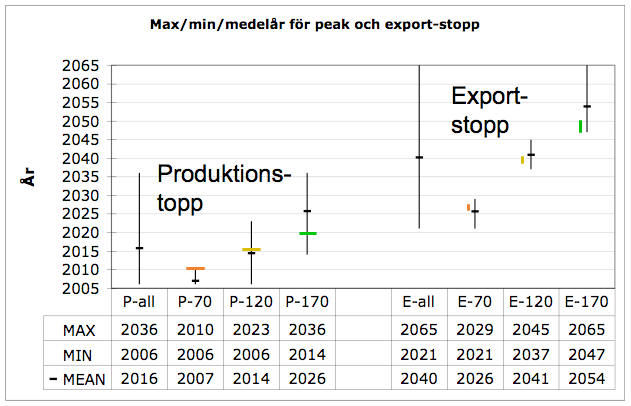
Figur 2. Min-, medel- och maxvärden på tidpunkt för produktionstopp (P) och exportstopp (E) uppdelat på mängd kvarvarande olja. De färgade markeringarna visar resultaten från en enklare s.k. Hubbert-kurva som använts för jämförelsesyfte."
Läs gärna hela Russian Oil - a Depletion Rate Model estimate of the future Russian oil production and export (pdf 8,9MB).
Tack Stefan, för tipset!
Peak Oil Review No. 42
1. New record prices.
2. The International Energy Agency’s monthly report
3. Canadian Natural Gas
4. Energy Briefs (18st, här 2 exempel:)
-For the nine months ended September 30, China’s crude imports are up 13.6% from a year earlier. The September volume, however, was 2.7% less than August’s. China’s monthly crude oil imports have been on a downtrend after reaching an all-time high in July.
-In their upcoming World Energy Outlook, the IEA will apparently say that they don’t believe the Alberta oil sands will make anything more than "an important dent" in the global oil market - this from an IEA official who did not want to be named ahead of the report's publication.
Commentary: Peak versus Plateau, the shape of oil to come
By Rembrandt Koppelaar, ASPO-Netherlands
Koppelaar går igenom vilket av två scenarios som är troligast, Peak eller platå? En Peak blir mycket svår att hantera, mängden energi som skall ersättas varje år blir mycket stor. En platå skapar handlingstid för viss omställning av världens energisystem. Blir det en påtaglig topp i den globala oljeproduktionen, dvs. Hubberts klassiska hypotes, eller blir det en böljande platå, som vissa senare profeter gör gällande. Koppelaar lutar åt att det blir en tydlig Peak åtföljd av en skarp eller måttlig nedgång.
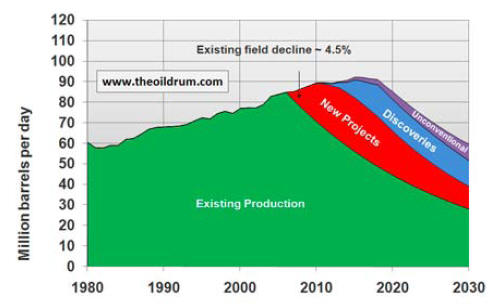
Citat: "My scenario exercise supports the view of a peak with a sharp to moderate decline. The addition of 500 billion barrels through technological advancement in combination with high oil prices, results in a higher peak and slower decline, not in a later peak or a plateau."
Peak Oil Review ges ut av ASPO-USA och en gratis prenumeration fås om man skriver till peakoilreview@aspo-usa.com
Nuläget och framtidsspekulationer
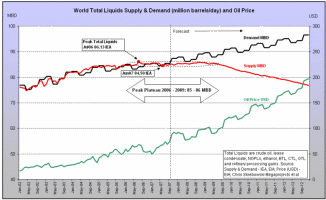 Det
finns en hel del som tyder på att Peak Oil nyss har passerat,
plus-minus något år. Ace på The OilDrum har sammanställt nuläget på ett
ganska spännande sätt. För närvarande är den absoluta produktionstoppen
av råolja och kondensat satt under 2005. Det är en fyllig artikel med
en hel del kommentarer som brukligt är.
Det
finns en hel del som tyder på att Peak Oil nyss har passerat,
plus-minus något år. Ace på The OilDrum har sammanställt nuläget på ett
ganska spännande sätt. För närvarande är den absoluta produktionstoppen
av råolja och kondensat satt under 2005. Det är en fyllig artikel med
en hel del kommentarer som brukligt är. Läs gärna mer i World Oil Forecasts Including Saudi Arabia, Kuwait and the UAE - Update Oct 2007
Oljebolag inleder egen krympning
Bloomberg berättar att Exxon köper in sina egna aktier i ganska stor skala. Enligt en uttolkare handlar det om att förbereda sig för en oundvikligt minskande produktion. Det ger tydligen i nuläget bättre avkastning för aktieägarna att betala för att minska aktiemängden än att investera i ny prospektering.
Läs mer i Slow, Steady Liquidation of the World Oil Industry